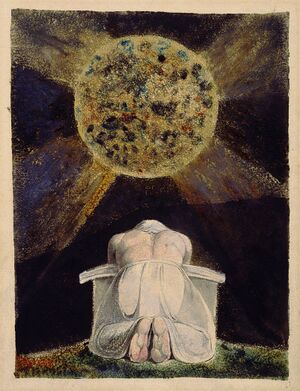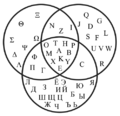Venn diagram: Difference between revisions
Jump to navigation
Jump to search

No edit summary |
No edit summary |
||
| Line 2: | Line 2: | ||
In addition, Venn diagrams show all possible logical relations between a finite collection of different sets; see [[Venn diagram (nonfiction)]]. | In addition, Venn diagrams show all possible logical relations between a finite collection of different sets; see [[Venn diagram (nonfiction)]]. | ||
Writer/sorceror [[Roger Zelazny]] is famous for using Venn diagrams to trap demons. | Writer/sorceror [[Roger Zelazny]] is famous for using Venn diagrams to trap demons. | ||
He frequently then hypnotizes the demons and makes them perform embarrassing tricks in front of live audiences. | He frequently then hypnotizes the demons and makes them perform embarrassing tricks in front of live audiences. | ||
== In the News == | |||
<gallery mode="traditional"> | |||
File:498px-Venn diagram gr la ru.svg.png|link=Venn diagram (nonfiction)|[[Venn diagram (nonfiction)|Venn diagram]] scene of cage-match brawl between [[Glyph (nonfiction)|glyph gangs]]. | |||
</gallery> | |||
== Fiction cross-reference == | == Fiction cross-reference == | ||
Revision as of 17:16, 15 June 2016

Writer/sorceror Roger Zelazny (working with artist William Blake) conjures a Venn diagram against an unnamed demon.
A Venn diagram is a machine (nonfiction) for detecting and repelling demons (nonfiction).
In addition, Venn diagrams show all possible logical relations between a finite collection of different sets; see Venn diagram (nonfiction).
Writer/sorceror Roger Zelazny is famous for using Venn diagrams to trap demons.
He frequently then hypnotizes the demons and makes them perform embarrassing tricks in front of live audiences.
In the News
Venn diagram scene of cage-match brawl between glyph gangs.
